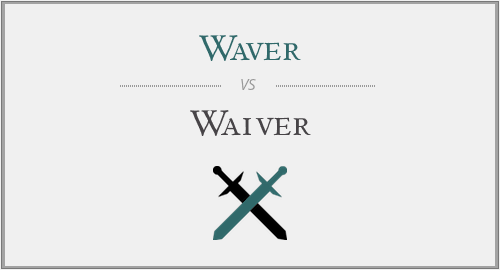I needed a waiver from the zoning board for the house because the lot was so small, but they let me build because it was next to the park.
Hermione could hear Ron’s broomstick wavering in the brisk winds.
This article will throw light on both the words; waver and waiver.
Origin:
Waver originated from Middle English: from Old Norse vafra ‘flicker’, of Germanic origin. Compare with wave.
Waver as verb:
Waver is used as a verb in English language where it means to move in a quivering way; or flicker.
The flame wavered in the draught.
The candlelight in the room wavered in a warm draught.
Waver also means to become weaker; falter.
His love for her had never wavered"
To be undecided between two opinions or courses of action is also known as waver.
She never wavered from her intention.
Waiver as noun:

Waver is used in English language as a noun which means an act or instance of waiving a right or claim.
Their acquiescence could amount to a waiver.
A document recording the waiving of a right or claim is also waiver.
Examples:
Oak Hills Local School District officials will apply for a two-year waiver to the all-day kindergarten mandate. [Cincinnati.com]
According to FCC rules, people who can’t get FOX can get a special waiver to receive a FOX feed from another affiliate. [KEPRtv.com]
In written responses to questions from the Washington Post and the Wall Street Journal, Hu showed no indication that China intended to waver from that path. [LA Times]
Much of our fresh resolve is already beginning to waver. [Financial Times]
Waver or waiver:
In writing, the difference between waver and waiver comes down to a tiny little i, but in reality, the difference is a whole lot more. Along with the help of our friends in Harry Potter, let’s take a look at these two words that sound exactly the same but mean two quite different things. Waiver is a noun with several meanings, including (1) intentional relinquishment of a right or privilege, (2) a dispensation, and (3) a deferment. In most cases, the one who relinquishes a right or privilege gives the waiver, while the one who benefits from the relinquishment receives the waiver. Waver is a verb meaning (1) to move unsteadily back and forth, (2) to vacillate, or (3) to tremble in sound.




Have a discussion about this article with the community:
Report Comment
We're doing our best to make sure our content is useful, accurate and safe.
If by any chance you spot an inappropriate comment while navigating through our website please use this form to let us know, and we'll take care of it shortly.
Attachment
You need to be logged in to favorite.
Log In